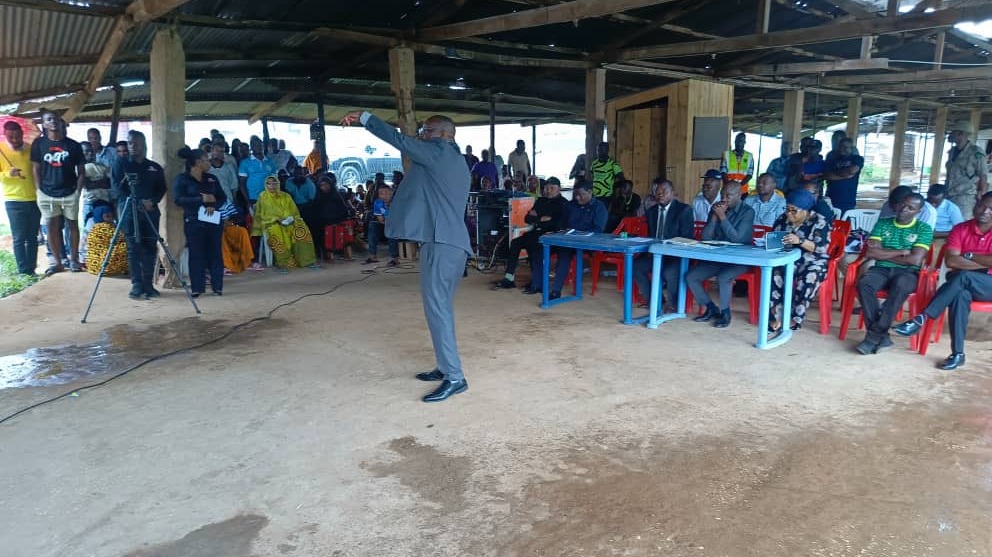Government engages Mbuyuni residents over BRT depot project

Residents of Mbuyuni in Kunduchi, Kinondoni Municipality, expressed resistance to vacating their land to pave the way for the construction of a Bus Rapid Transit (BRT) depot under Phase 4 of the Dar Rapid Transit (DART) project. A sensitization meeting held today aimed to address their concerns and outline the benefits of the project.
The meeting, organized by the DART Agency, was attended by key government officials, including DART Agency Chief Executive Dr. Athumani Kihamia, Kinondoni District Commissioner Saad Mtambule, Kinondoni Deputy Mayor and Kunduchi Councillor Michael Urio, and Kawe Member of Parliament Bishop Josephat Gwajima.
Dr. Kihamia emphasized the significance of the BRT project in mitigating urban congestion and addressing environmental challenges in Dar es Salaam. “The BRT project is critical for our city,” he said. “By reducing congestion and air pollution, we aim to create a more sustainable environment for all. The depot at Mbuyuni will play a crucial role in this by accommodating the 590 buses, which will enhance operational efficiency.”
The proposed depot, located along Bagamoyo Road, will cover an area of 156,000 square metres, large enough to accommodate 590 buses. This infrastructure is strategically positioned to support the BRT trunk line extending towards Bagamoyo town in the Coastal Region. However, residents expressed concerns about compensation and relocation.
Phase 4 of the BRT network spans from the city center to Tegeta DAWASCO, covering major roads such as Bibi Titi Road, Ali Hassan Mwinyi Road, and Bagamoyo Road. Another branch of Phase 4 extends from Mwenge to Ubungo via Sam Nujoma Road, with the total network covering 30.1 kilometers. The infrastructure development is being financed by the World Bank at a cost of US$ 97.9 million.
Moderating the discussion, Kinondoni District Commissioner Saad Mtambule underscored the government’s commitment to strategic infrastructure projects. “The BRT project is one of the transformative initiatives by the government to improve people’s lives,” he said. “We understand the challenges you face, but let us work together to ensure this project benefits everyone.”
The meeting turned heated as some residents questioned the adequacy of the proposed compensation. Others raised concerns about losing their livelihoods and being uprooted from ancestral land. The project will affect 114 households and cost the government TZS 14 billion in compensation.
The construction for Phase 4 has been divided into three lots. Lot 1 involves road works including Ali Hassan Mwinyi Road from the junction of Bibi Titi and Azikiwe Street; Bagamoyo Road from Morocco to Mwenge, and the Ubungo flyover to Sam Nujoma Road, covering 13.5 kilometers. The construction progress for Lot 1 has reached 9.2 percent and is expected to cost TZS 174,380,157,323.00. All works in Lot 1 have been planned to last 18 months, starting from June 30, 2023.
Lot 2 focuses on road works for Bagamoyo Road from Mwenge to Boko DAWASA, covering 15.63 kilometers at a cost of TZS 193,855,936,443.00. The construction progress for Lot 2 has reached 15.2 percent.
Lot 3 involves building works, including the construction of two depots at Mbuyuni, Simu2000, and Kivukoni at a cost of TZS 60,984,151,987.00. The construction progress for Lot 3 has reached 3 percent.
Bishop Josephat Gwajima, Kawe’s Member of Parliament, reminded the residents about the land ownership policy in Tanzania. “All land in Tanzania belongs to the government,” he explained. “The government reserves the right to change the use of land for public interests. I urge you to cooperate for the greater good of our community and nation.”
Despite these assurances, the residents remained divided. Kunduchi Councillor Michael Urio encouraged those willing to accept compensation to proceed. “Compensation will be paid promptly,” he assured. “Those ready to vacate should take the opportunity as soon as the payments are ready.”
One resident, speaking on condition of anonymity, expressed frustration. “We understand the importance of development, but what about our homes and businesses? The compensation must be fair and timely,” they said.
Dr. Kihamia reassured the residents that the government would adhere to fair compensation practices. “We are committed to ensuring that the compensation process is transparent and that no one is left disadvantaged,” he stated.
The meeting also touched on the broader benefits of the BRT project, including economic growth and improved transportation efficiency. “Once operational, the BRT system will ease commuting, save time, and reduce transportation costs for residents,” noted Dr. Kihamia.
Kinondoni District Commissioner Mtambule echoed this sentiment, emphasizing the importance of collective responsibility. “Development comes with sacrifices,” he said. “Let us embrace these changes for the betterment of future generations.”
Bishop Gwajima appealed to residents to trust the government’s vision. “This project is not just about infrastructure; it’s about transforming lives,” he said. “Let us support this noble initiative.”
However, skepticism persisted among some attendees. “Promises have been made before,” said another resident. “We need assurance that this time, things will be different.”
To address these concerns, the DART Agency announced plans for ongoing dialogue with the community. “We will continue to engage with you to address your issues and ensure a smooth transition,” said Dr. Kihamia.
The meeting concluded with an appeal for unity and understanding. “Let us move forward together,” urged Councillor Urio. “This project is for all of us.”
As the DART project progresses, the government faces the challenge of balancing infrastructure development with the rights and needs of affected communities. The next steps will likely involve detailed consultations to ensure all parties reach a mutually beneficial resolution.

